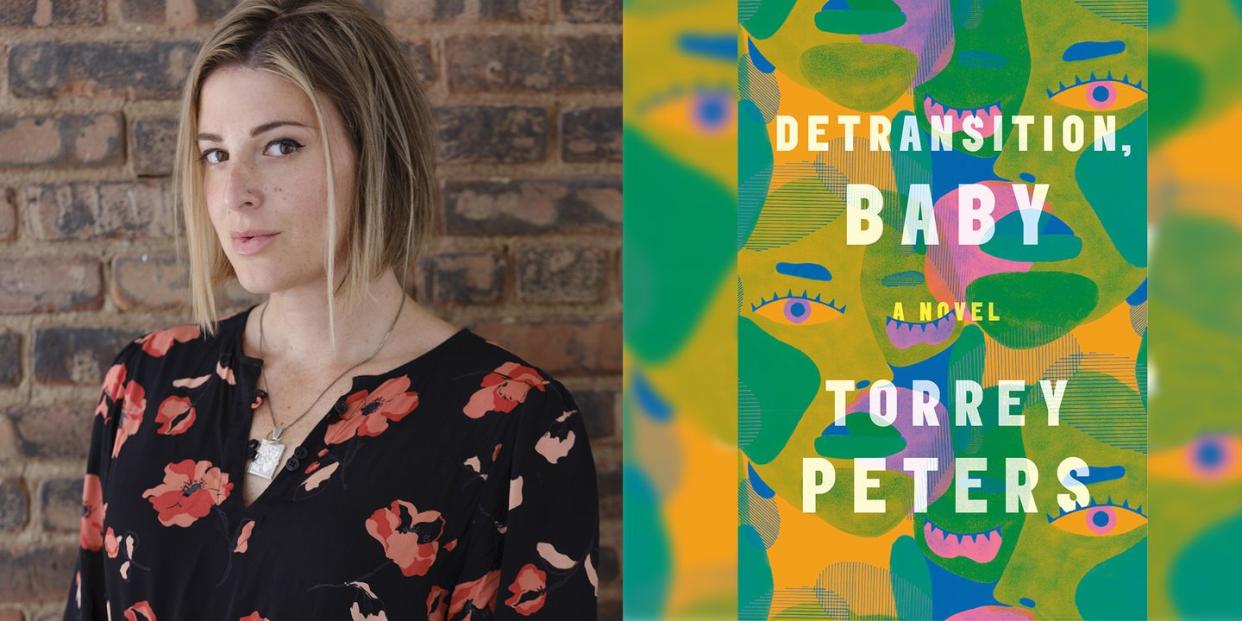Detransition, Baby is a Boundary-Breaking Story of Divorce and Identity

In 2015, Sean Baker’s indie film Tangerine premiered to virtually universal acclaim. It tells the story of a woman newly released from prison who, along with her friend, tries to track down her cheating boyfriend. The movie won praise and notoriety partly because it was entirely shot on an iPhone 5. It also happened to star two trans women portrayed by actual trans women.
In this sense, Tangerine served as a source of inspiration for author Torrey Peters, whose new novel, Detransition, Baby, is out now.
“Tangerine is just a thriller,” Peters tells OprahMag.com. “It’s a chase movie about two trans women tracking down a guy who’s missing. It’s not trying to make a point; it’s just doing it. That’s so powerful.”
Ditto for Detransition, Baby, Torrey’s third book and first for a major publisher, a kaleidoscopic story centered on three individuals—a trans woman, a cisgender woman, and a man who has detransitioned—who become an unlikely, unclassifiable family unit. Yet while the book beautifully lays bare the specific plights (and pratfalls) of living and dating as a trans person, the novel doesn’t dwell on dumbed-down identity politics, eschewing explanation in favor of a propulsive story about difficult people trying to break free of the patterns that have defined their lives.
Protagonist Ames—formerly Amy—had been told by a doctor that his hormonal restructuring will most likely render him unable to bear children; it’s very much a surprise, then, when Ames’ lover, Katrina, tells him she’s pregnant. Wary of traditional fatherhood and the “gravity of the nuclear family,” Ames puts forth a modest proposal: he and Katrina could raise the child with his ex-girlfriend, Reese, a trans woman longing to be a mother.
Katrina is Ames’s boss, a once-married woman whose miscarriage led to a subsequent divorce. “My marriage was like a push-up bra,” Katrina tells him. “It looked pretty good underneath a shirt, but you know it’s all just padding and by the end of the day can’t wait to take the damn thing off.”
The book is dedicated to “divorced cis women,” who, like Peters herself, “had to face starting their life over without either reinvesting in the illusions from the past, or growing bitter about the future.”
When Peters started writing the novel, she found herself trying to reconcile what she assumed were two different audiences: cis women and trans women. But as she continued creating, she began considering what it’s like to be divorced in one’s thirties, which she too had gone through, and the similarities between that experience and gender transition.
“I looked around at my friends, at my role models, and a lot of us were stuck in this kind of stasis where your 30s look a lot like your 20s,” Peters says. “You transition and then you’re like, ‘Well, now what? What do I do? We made a huge choice to do this, to transition, and now what are we going to do with this huge choice?’” It was then she discovered the readership she once thought of as bifurcated was actually “the same audience.”
As Reese tells Katrina, “Divorce is a transition story,” especially for women who “felt their divorce as a fall. The ones who have seen how the narratives given to them since girlhood have failed them, and who know there is nothing to replace it all.”
Dynamic and vibrant, Detransition, Baby is a book about womanhood that happens to star two trans women. It is a fiercely confident novel about aging, about how to make meaning out of one’s life, how to escape the traditional definitions of how one ought to be.
“The question for me,” Peters says, “wasn’t so much to prescribe a way that you should live so much as a way to say, ‘come on, let’s live.’”
For more stories like this, sign up for our newsletter.
You Might Also Like

